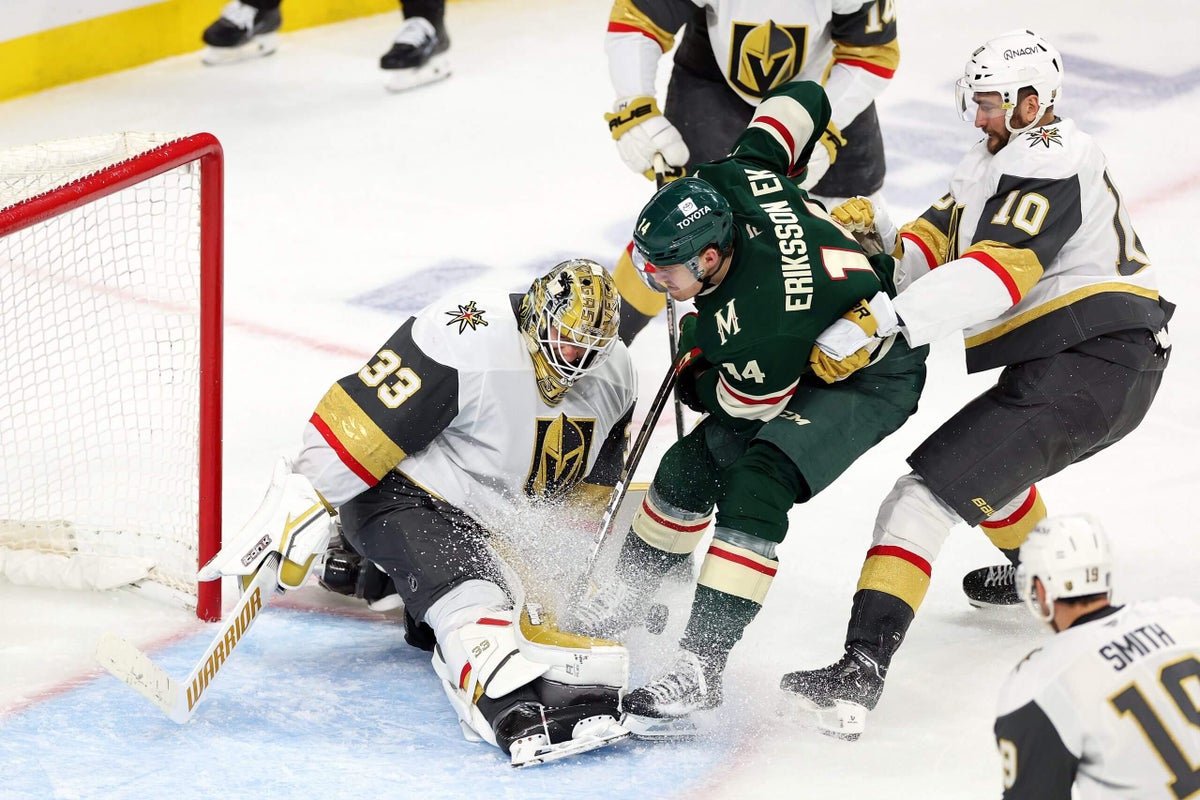

Saturday’s NHL playoff slate saw the Colorado Avalanche shut out the Dallas Stars to even the series, the Tampa Bay Lightning get their first win in their Round 1 series against the Florida Panthers and the Vegas Golden Knights squeak by the Minnesota Wild with an overtime victory to tie up the series.
Advertisement
Also in overtime, the Ottawa Senators avoided a sweep by besting the Toronto Maple Leafs.
Here’s how Saturday’s Game 4 — or if you’re a Florida-based team, Game 3 — action went down across the league:
(Series tied 2-2)
Avs set the tone
Logan O’Connor opened the scoring 12:39 into the game on a short-handed goal. His pressure at the point on Thomas Harley led to the Stars defender falling at the Avs’ blue line, and the speedy O’Connor flew away on a breakaway and buried it top corner, stick side.
Nathan MacKinnon made it 2-0 with a one-time blast on the power play with just 24 seconds to go in the opening period. Coach Jared Bednar talked between games about needing better execution from his power play. He got it on that power play. The late-period goal stung Dallas. — Pierre LeBrun
A tight-checking series
The Avs were by far the superior team Saturday night, but overall it continues to be a tight-checking series.
Neither team cheats for offense, every inch of ice is hard-earned.
That’s what you get when you have two of the top Cup contenders in an opening-round series that should be played in the conference final.
“You got two teams that are really detailed, I think we have a really intricate understanding of each other’s games because of the history of the two teams,’’ Stars coach Peter DeBoer said Saturday morning. “There’s not a lot of room out there. The one are we talked about that we have to clean up is our penalties. I think we’ve taken way too many penalties against a really good team.
“But I don’t expect to be a lot of room here the rest of the series. I don’t think that’s going to change.’’
Bednar echoed a similar refrain Friday after practice.
“Creating the offense in this series is the challenge,’’ Bednar said. “Well, there’s challenges on the defensive side of it, too. I just think we’ve done a really nice job for the bulk of the series in that …
“But we’re studying the offensive numbers and we did a better job getting to the net front (in Game 3), coming up with some dirty chances like we did in Game 1.
Advertisement
“The numbers will tell you that, because all that data is available to us. For me, we got to find a way to capitalize on a couple of our like quality scoring chances.’’
Which, as Bednar said, also includes having a better power play.
The Avs responded Saturday night with more looks and better execution all right. The second period alone saw the Avs with a 24-4 edge in scoring chances and 8-1 in high-danger scoring chances, according to Natural Stat Trick.
My sense of it is that a tight-checking series is more comfortable for the way the Stars are built and approach the game. But the Avalanche’s aggressive re-do of their roster in-season, I believe, has made them more adept at dealing with this kind of series. They’ve got the personnel for it now.
Of course, the Avs would rather run-and-go and fly up and down the ice, kind of like they did in the second period Saturday night, but they know the Stars well and understand that’s not going to be possible for the most part in this series. They’ve got to be patient in creating their offense. They played a near-perfect game Saturday night that way. — LeBrun
(Maple Leafs lead series 3-1)
The Sens’ hot start
The Senators played their best first period of the series on Saturday night.
Yes, they benefited from Max Domi’s unforced error. But a power-play goal was sorely needed. They entered the game with a 22.2 percent rate, 11th-best among playoff teams.
Tim Stützle and Shane Pinto, two important cogs in the Sens’ young core, scored their first playoff goals in a crucial first frame of Game 4. Both were being leaned upon for their defence in the series and each player had one assist entering Game 4. Pinto has remained on the Sens’ shutdown line alongside Ridly Greig and Michael Amadio. Meanwhile, Stützle was moved to a line with Drake Batherson and housemate Fabian Zetterlund, as was the case at the end of Game 3.
Advertisement
Stützle’s defensive prowess was on display throughout the series, but he had yet to score a goal until he blasted the puck past Anthony Stolarz.
Then, after a David Perron penalty forced them shorthanded, Pinto was sprung onto a breakaway. He scored three shorthanded goals all season. His latest one essentially capped Ottawa’s great start. It would’ve been near perfect had it not been for the John Tavares goal allowed late in the period. The Sens outhit and outchanced the Leafs in all situations. — Julian McKenzie
Jake Sanderson’s heroics
Jake Sanderson’s 2024-25 season has seen him take a significant step in his development as a young No. 1 defenceman. His game-winning goal in Game 4 now stands as an early hallmark in his career. More importantly, it keeps the Senators alive in the Stanley Cup playoffs for at least one more game.
“Probably No. 1,” Sanderson said of where he’d rank the moment. “Crazy atmosphere again. So, it was pretty awesome.”
It came well after a significant mistake.
Sanderson and his everyday partner Artem Zub failed to close down Matthew Knies at the blue line, leading to the forward speeding through the neutral zone before beating Linus Ullmark on a breakaway and scoring a tying goal.
“We’ve got to communicate better,” Sanderson said of the play. “I think the puck just squirted out in between us. There wasn’t a lot of talking. We’ll clean that up.”
Sanderson and Zub are far and away the Senators’ best defensive pairing. The pairing posted the Sens’ best expected goals per 60 rate of all Sens’ pairings (minimum 200 minutes according to MoneyPuck) and can be counted on in most situations. But their misplay on Knies stood out.
But in overtime, after the Senators were given the mantra to shoot early and often, Sanderson heeded those words after Tyler Kleven drove into the offensive zone and rimmed the puck around the boards. Sanderson seemingly always skillfully keeps pucks from leaving the attacking area. Those skills served him well as his ensuing shot beat Stolarz and sent fans into a frenzy. — Joshua Kloke
Advertisement
(Panthers lead series 2-1)
Depth scoring, finally
Tampa Bay hadn’t been getting much scoring from anyone in the first two games of this series, but that’s particularly true of the Lightning’s depth players.
Jake Guentzel and Brayden Point have been productive, but they were the only ones.
Finally, Nick Paul changed that narrative.
Finding himself on a two-on-one with the game knotted at one in the second period, Paul looked off Guentzel and fired a shot that snuck under Sergei Bobrovsky’s left leg.
Ryan McDonagh noted that it was a team effort for the Lightning and, after a very sluggish opening period, there’s not much question that it was the Lightning that played at a considerably higher level than the Panthers. — Josh Yohe
Unhappy returns
Three players made returns of sorts for the Panthers.
Aaron Ekblad was back in the lineup after serving a 20-game suspension. It wasn’t a day to remember for the longtime member of the Panthers’ blue line. Ekblad and defense partner Gustav Forsling were on the ice for four goals against and were each a minus-4 on the afternoon.
Matthew Tkachuk was playing in his first home game since Feb. 8 and made his presence felt early and often.
He scored on his second shift of the day, igniting a surge of energy during a first period that saw Florida utterly dominate the game. Tkachuk, in customary fashion, started numerous fights against the Lightning and was tagged with the five-minute penalty late in the third.
Aleksander Barkov returned to the series after missing the final 10 minutes of Game 2 because of a late hit from Brandon Hagel.
The captain of the Panthers was robbed on a couple of occasions by Andrei Vasilevskiy, but otherwise was pretty quiet. Barkov was held without a point and was on the ice for two Tampa Bay goals. — Yohe
Advertisement
(Series tied 2-2)
Nicolas Roy steps up big for the power play
Early in the third period, with Mark Stone bloodied from a high stick and heading to the dressing room, coach Bruce Cassidy needed to replace his captain for the ensuing four-minute power play. He chose to send out Nicolas Roy, and he delivered with the exact type of goal Cassidy was seeking.
Filip Gustavsson made consecutive saves on Ivan Barbashev and Tomas Hertl, but Roy battled through contact to get to the rebound and buried it to tie the game 2-2. Roy had only two power-play goals in the regular season, but scored one of the biggest of the season on Saturday.
“There was a shot from Pavel (Dorofeyev) on the side there, and there was kind of a rebound and it was kind of bouncing a bit in the slot,” Roy said of his goal. “Usually in those moments, it’s a little bit scrambling, trying to block shots. I thought there was a little bit of space and I took it.”
Roy has been one of Vegas’ most consistent forwards in this series. He assisted on Howden’s game-winner in Game 1 and has helped the fourth line win the possession battle when they’re on the ice in nearly every game.
Vegas’ second-ranked power play has been crucial, scoring twice on Saturday and four times in the first four games. Shea Theodore’s power-play goal opened the scoring and was the result of a great screen by Stone in front of Gustavsson.
“Trying to get some confidence,” Theodore said. “Sometimes in the playoffs, it seems like nothing goes right — a couple bounces here and there. So I’m happy to turn it around and get one on the board.” — Jesse Granger
Yakov Trenin’s turn
One of the reasons the Wild signed Yakov Trenin last summer was because they felt he was built for playing late in the season, built for playoff hockey. That’s where his true value would show. And despite not playing a lot of minutes in this series, Trenin and the Wild’s fourth line have come through. That included Game 4, with Trenin creating the tying goal by Marco Rossi midway through the first period.
Advertisement
The Wild were down 1-0 when Trenin raced in on the forecheck and separated Nicolas Hague from the puck behind the net. Trenin then found Rossi in front with a slick pass, and Rossi scored for the second straight game.
It was a disappointing regular season for Trenin, who had seven goals in 76 games and was a healthy scratch at one point. But Trenin has made some impactful plays so far. Wild coach John Hynes hasn’t played the line with Trenin, Rossi and Justin Brazeau a lot, especially in Game 4. The trio didn’t play the last 13:05 of the second period, and their next shift wasn’t until six minutes into the third period.
Rossi, the team’s third-leading goal scorer during the regular season (24), played just 4:40 through two periods and 11:01 for the game. Gus Nyquist, who has zero five-on-five goals in 26 games with the Wild and one in his last 73 games, played 6:11 through two periods and 10:48 overall.
When asked about Rossi, and his line’s playing time, especially in the second period, Hynes said: “I think some of it goes into special teams and comes into matchups, comes in different situations. So we’ll take it game by game here.”
Trenin had a chance to give the Wild the lead back with eight minutes left in the third, but Adin Hill made a tremendous save on a breakaway. — Michael Russo
(Photo: David Berding / Getty Images)
This news was originally published on this post .









Be the first to leave a comment